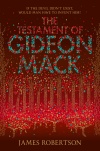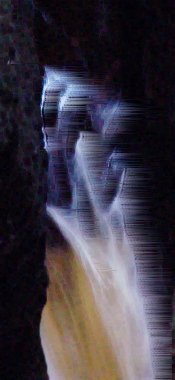A Brief History of Gideon Mack | Scotgeog | The Testament of Gideon Mack, James Robertson
Home Page

Gideon's Monimaskit

The Black Jaws

Interview with James Robertson

A Brief History of Gideon Mack

Points of View

Gideon's Monimaskit

The Black Jaws

Interview with James Robertson

A Brief History of Gideon Mack

Points of View

The Testament
of Gideon Mack
published by Hamish Hamilton, is available
from all good bookstores in the real world and online.
For another interview with James Robertson and notes on The Testament of Gideon Mack for reading groups visit The VP Book Club.
A Brief History of Gideon Mack
(Submitted anonymously by ‘One Who Upholds the Truth’)As there has been so much speculation and lurid fabrication about the character and behaviour of the Reverend Gideon Mack, I feel it incumbent upon me, as one who knew him but who must, for the time being, remain anonymous (for reasons I cannot elaborate upon here), to offer this short but accurate summary of his life. I seek no part in any controversy, but only to give the facts as they really were and are.
Gideon Mack was born in the village of Ochtermill, Stirlingshire on 17th March 1958. His parents were James Mack, minister of the Church of Scotland at Ochtermill, and Agnes Mack (née Campbell). Gideon was their only child. He was educated at Ochtermill Primary and Tulloch High Schools, and subsequently studied History at the University of Edinburgh, graduating as an MA (Hons) in 1980. He went on to complete the Bachelor of Divinity degree at Edinburgh, worked as an assistant minister in the parish of Leith for five years before becoming minister at Monimaskit, a small town on the east coast of Scotland between Dundee and Aberdeen, where he served from 1989 until his suspension in 2003. He married Jennifer Watson (1958–1992). They had no children.
Gideon Mack was a conscientious and popular minister, who raised large amounts of money for various charities through community-wide campaigns, and through his own running in marathons. Unfortunately all his achievements have become overshadowed by the events of the last year of his life, when he appears to have suffered some kind of mental breakdown, leading to the erratic behaviour and delusional claims which resulted in his suspension.
In the autumn of 2003 he was involved in an accident a few miles from Monimaskit at the Black Jaws river gorge. Attempting to save a dog which had got into difficulty, he slipped and plunged more than a hundred feet into the water below. A rescue attempt proved futile. It was assumed that the minister must have perished, either killed by the fall or drowned, and, given that the river is believed at one point to go completely underground before re-emerging and continuing on its way to the coast, there was little prospect of his body ever being recovered.
However, three days after this incident, Mr Mack was found washed up on the bank of the Keldo a short distance downstream of the Black Jaws, not only alive but without a broken bone in his body. True, he was badly battered, he had a large bruise on the side of his head, and his right leg had sustained some kind of internal damage which left him with a severe limp, but he had somehow survived three nights outdoors and a subterranean journey that no creature, except a fish, could have been expected to survive. He was taken to hospital in Dundee, where he regained consciousness and astonished medical staff by making such a speedy recovery that in less than a week he was discharged and sent home. It was while convalescing back in Monimaskit that Mr Mack began to claim that he had been rescued from the river by a man inhabiting the caverns through which he said it passed, and that this person was none other than the Devil, with whom he had had several long conversations in the course of the three days. Clearly such delusions could only be the result of injury to the brain caused by his ordeal. A few days later Mr Mack, despite his seeming physical and mental frailty, insisted on taking the funeral service of an old friend, and conducted the event in a way which some considered not just unorthodox but incompatible with the role of a Church of Scotland minister. After the interment he publicly repeated his story that he had met and conversed with the Devil. Finally, at the gathering in the church hall which followed, he made declarations of such a scandalous nature that the Monimaskit Kirk Session had no option but to refer the matter to the local Presbytery. His suspension followed, and in due course a libel was drawn up and served on him, but no date had been set for the case to be heard before Mr Mack’s disappearance brought all proceedings to a halt. He seems to have left his manse on the weekend of 10th–11th January, 2004, but it was not until Wednesday 14th January that the alarm was raised after police in Perth, checking up on a red Renault that had been collecting parking tickets for several days in a street close to the railway station, found that the car was registered in Mr Mack’s name. A nationwide search was instigated, but no trace of him was found. In late September it has been claimed that a manuscript purporting to be Mr Mack’s memoir or ‘testament’ was discovered in a Bed & Breakfast establishment in the village of Dalwhinnie, Inverness-shire. It has been suggested that this document revealed that he had stayed there the previous January under the assumed name of Robert Kirk, and that as a result a renewed search for him in the hills around Dalwhinnie took place. However the actual existence of this ‘testament’ has never been established, although it is insisted upon by persons in whose interests it is to make dubious assertions about Mr Mack.
It is true, though it has nothing to do with any clues contained within the said ‘testament’, that in October 2004 human remains were found on the remote mountain of Ben Alder. Through dental records and other evidence, these remains were determined to be those of the Reverend Gideon Mack.
A forensic investigation was carried out and a report made to the Procurator Fiscal. It seems likely that the body lay undiscovered for several months, and this suggests that death occurred during the previous winter. Due to the body’s advanced state of decay, it was not possible to establish the precise cause of death, but there were no signs of violence or of the involvement of a third party. The Procurator Fiscal ruled that there were no suspicious circumstances, and the remains were buried without any kind of ceremony in a cemetery in Inverness.
These are the facts of the matter. The rumours and allegations of atheism, adultery, ghosts, magical standing stones and, of course, meetings with the Devil in a cave, are all completely unsubstantiated and derive entirely from the so-called Testament of Gideon Mack, a work of fiction dressed up as fact, which has lately been published by the writer James Robertson.[For Robertson's side of the controversy, see 'Interview with James Robertson'.
That anyone should feel it necessary or amusing to besmirch the good name of a good man by concocting and publishing such a childish, offensive and incredible forgery is a sad reflection on the modern world. Mr Robertson is the author of, among other works, a book entitled Scottish Ghost Stories, and claims to be a sceptic (that is to say, he ‘neither believes nor disbelieves’) when it comes to matters of ‘the supernatural’. We trust we need make no further comment.

© 2006-2026 James Robertson. Design by TannerRitchie Web Applications